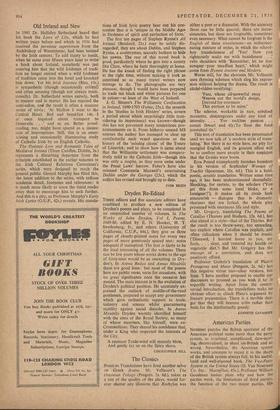The Classics
PENGUIN Translations have fired another salvo on Greek drama. Mr. Vellacott's The Oresteian Trilogy (Penguin. 2s. 6d.), taken as a test of the quality of the plays, would for- ever shatter any illusions that kschylus was either a poet or a dramatist. With the accuracy there can be little quarrel; there are incon- sistencies, but these are forgivable, sometimes even necessary. What cannot be forgiven is the English of these translations—an indiscrimi- nating mixture of styles, in which the school- boy translationese of `Yes! Now you righteously mulct me with banishment . . rubs shoulders with 'Remember, let no fear conquer • your steadfast heart,' which might come from Hymns Ancient and Modern.
Worse still, for the 'choruses Mr. Vcllacott uses rhyming schemes which clog his expres- sion without helping the drama. The result is cliche-ridden versifying : 'Fate, whose all-powerful sway Weaves out the world's design, Decreed for evermore This portion, to be mine.'
The scheme, workable in rare, subdued moments, distintegrates under any kind of intensity. . • . 'For reckless passion . . . conies thwart and sly/To flout the fond connubial tie.'
This sort of translation has been perpetuated until we now talk of 'a modern style of trans- lating.' But there is no style here, no pity for mangled English, and its greatest effect will be to confirm more people in their suspicion that the Greeks were bores.
Ezra Pound triumphantly banishes boredom in his version of Sophocles' Women of Trachis (Spearman, 10s. 6d.). This is a bold, poetic, actable translation. Written some time ago, it has been underestimated shamefully. Shocking, for certain, to the scholars (`You get this from some local bloke, or a foreigner?'), it makes all its rivals look amateurish — dialogue that is dramatic, choruses that are lyrical, the whole play presented with enormous life and style.
Mr. Gregory, translating The Poems of Catullus (Thames and Hudson, 12s. 6d.), has also aimed at a style—that of the Thirties. But the result is too throw-away, too sprawling, too explicit where Catullus was implicit, and often ridiculous when it should he ironic. (`Diseased, I hurried home to you, my farm, . . . slept, and restored my health on vegetal* diet.') But Mr. Gregory has the courage of a conviction, and does not positively offend. •
Professor Guthrie's translation of Plato's Protagoras and Mena (Penguin, 2s. 6d.) has this negative virtue too—clear versions, but limp. 'I have another proposal to enable our discussion to proceed as you wish it to' /5 soporific writing. Apart from the contro- versial introduction. the translations make no obvious effort to clinch Plato's argument by literary presentation. There is a terrible dan- ger that they will become cribs rather than baits for the intellectually greedy.
KENNETH CAVANDER


































 Previous page
Previous page